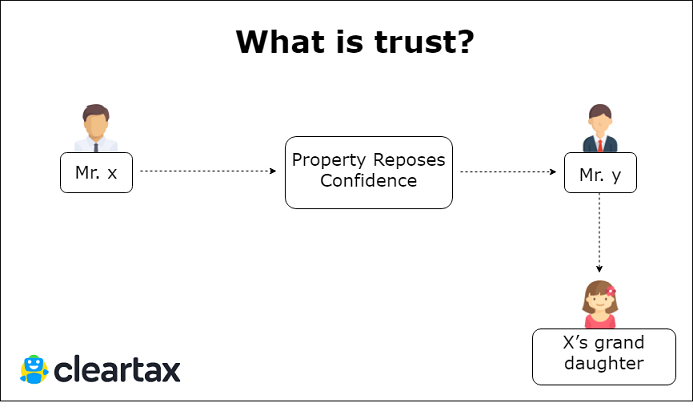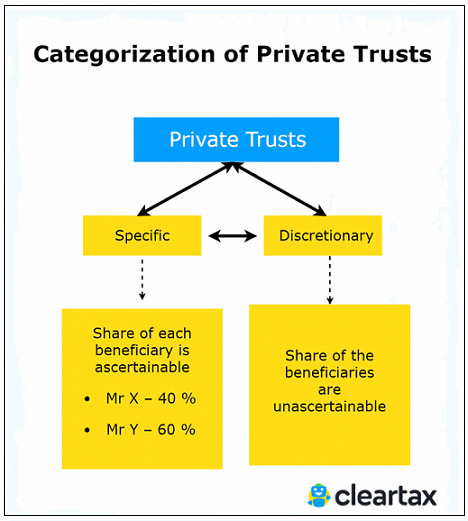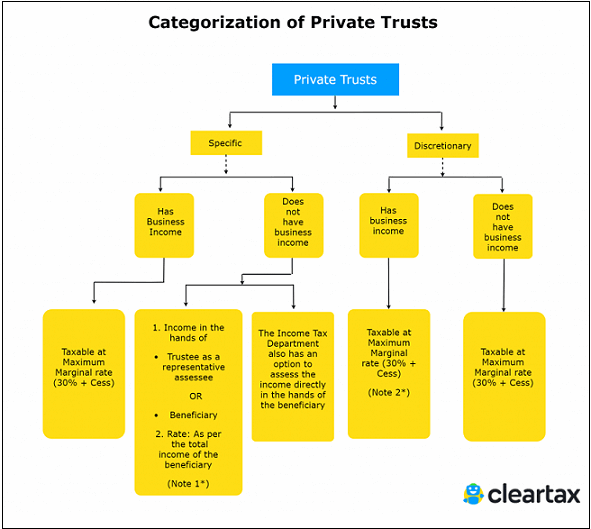Indian Trusts Act 1882 - Objectives, Registration & Taxation
The Indian Trusts Act, 1882 is the primary law governing private trusts in India. It lays down the legal framework for the creation, administration, and taxation of trusts created for the benefit of specific individuals or families.
Key Highlights
- The Indian Trusts Act, 1882 governs private trusts only, not public or charitable trusts.
- A trust involves three parties – settlor, trustee, and beneficiary.
- Trusts can hold movable and immovable property, including cash, securities, and real estate.
- Registration is mandatory for private trusts involving immovable property.
- Private trusts are taxed either at individual slab rates or maximum marginal rate, depending on structure.
What is a Trust?
A trust is a legal arrangement where the owner of a property transfers it to another person, who holds and manages it for the benefit of a third person. The instrument by which this entire trust is declared/created is called “the instrument of trust” or the “trust deed”.
The property transferred may include:
- Real estate
- Cash
- Shares and securities
- Any valuable movable or immovable asset
Example
Mr X transfers his bungalow to Mr Y to hold it for the benefit of X’s minor granddaughter. Mr X trusts Mr Y to manage the property responsibly until the beneficiary can receive it. This arrangement is a trust.

Applicability of the Indian Trusts Act, 1882
The Indian Trusts Act regulates trusts in India. The Indian Trusts Act, 1882 applies to private trusts across India. Public trusts in India are usually governed by state-specific legislation, such as The Maharashtra Public Trust Act, 1950.
The Indian Trusts Act, 1882 does not apply to:
- Waqfs
- Hindu Undivided Family (HUF) arrangements governed by personal law
- Religious or charitable endowments
Parties in a Trust
Every valid trust involves the following parties:
- Author/Settlor/Trustor/Donor (Mr X): The person who wants to transfer his property and reposes confidence on another for the creation of the trust.
- Trustee (Mr Y): The person who accepts the confidence for the creation of the trust
- Beneficiary (Mr X’s granddaughter): The person who will benefit from the trust in the near future.
Objectives of a Trust in General
The main objective is that the trust should be created for a lawful purpose. For example, if Mr X had stolen money from a bank and given it to Mr Y with the intention of giving the money to poor children then, in this case the trust itself is void as the very main purpose is unlawful.
As per Section 4 of the Indian Trusts Act, a purpose is unlawful if it:
- Is forbidden by law
- Defeats the provisions of law
- Is fraudulent
- Involves injury to another person or his property
- Immoral or against to public policy
Who can Create a Trust?
A trust may be created by:
- Any person competent to contract, including:
- Individuals
- Hindu Undivided Families (HUFs)
- Companies
- Associations of Persons (AOPs)
- For a trust created on behalf of a minor, prior permission of the Principal Civil Court of original jurisdiction is required.
The ability to create a trust also depends on the extent to which the settlor can legally dispose of the property.
Types of Trusts
There are two types of trusts:
- Private Trusts: A private trust is for a closed group. In other words, the beneficiaries can be identified. Eg: A trust created for the relatives and friends of the author.
- Public Trusts: A public trust is created for a large group, i.e. the public in large. Eg: Non-Profit NGO’s Charitable Institutions for the general public.
Registration Mandates for a Private Trust
Section 5 of the Act states that with respect to:
- Immovable property: A private trust must be created by a non-testamentary instrument in writing. Further, the non-testamentary instrument needs to be signed by the author of the trust or the trustee and has to be registered. However, if the non-testamentary instrument is created by a will, registration is not necessary.
- Movable property: A trust in relation to movable property can be declared as in the case of immovable property or by transferring the ownership of the property to the trustee. Hence, registration is not mandatory.
Taxation of Private Trusts
From the purpose of income tax, private trusts can be categorized into two types.
I. Specific (Determinate) Trust
II. Discretionary Trust

For income-tax purposes, private trusts are classified based on the determinacy of beneficiaries.
I. Specific (Determinate) Trust
- Beneficiaries and their shares are clearly defined
- Taxed at individual slab rates applicable to beneficiaries
Note 1:
Exceptions where individual slab rates apply at trust level:
- Trust is created exclusively for dependent relatives
- It is the only trust created by the settlor
II. Discretionary Trust
- Beneficiaries or their shares are not specifically defined
- Taxed at the Maximum Marginal Rate (MMR)
Note 2:
Exceptions where individual slab rates apply at trust level:
- If none of the beneficiaries have income exceeding the basic exemption limit, and
- None of them are beneficiaries under another trust

Indian Trusts Act PDF
You can download the Indian Trusts Act, 1882 PDF from the official legislative sources for reference.
A trust is a legally recognised arrangement where property is transferred to a trustee for the benefit of specific individuals. The Indian Trusts Act, 1882 provides the legal foundation for private trusts in India, covering their creation, objectives, registration, and taxation. When structured correctly, trusts serve as effective tools for family asset management, succession planning, and financial security.
Disclaimer: The materials provided herein are solely for information purposes. No attorney-client relationship is created when you access or use the site or the materials. The information presented on this site does not constitute legal or professional advice. It should not be relied upon for such purposes or used as a substitute for legal advice from an attorney licensed in your state.
